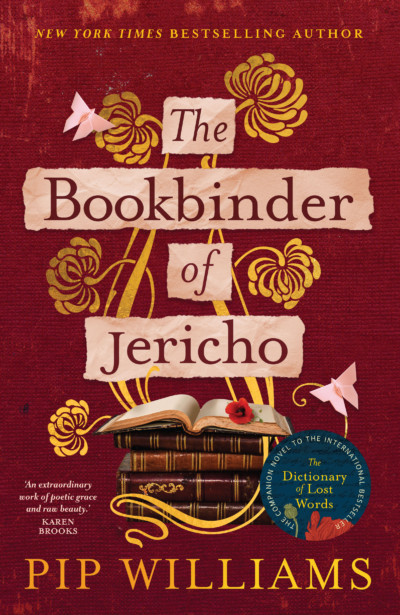Author Pip Williams received international acclaim for her best-selling debut novel The Dictionary of Lost Words, and enamoured readers will be equally as fascinated by her companion novel, The Bookbinder of Jericho (Affirm Press 2023). With a large cast of characters (some of whom – rather endearingly – make a cameo appearance after we met them in Lost Words) and a meticulously researched historical setting, The Bookbinder of Jericho is certain to appeal to Pip Williams’ fans.
This novel once again examines a particular slice of history through the eyes of the women instrumental in making it, rather than the traditional male gaze. Williams has a talent for unearthing obscure and interesting facts, and for imagining exactly what it might be like for a certain woman of a certain time to juggle her work, family responsibilities and cultural expectations. She combines the complex details of the process of book binding with a story filled with human emotion, ambition, choices, love, sacrifice and social class. The result is a tale of London in the midst of the Great War, when men volunteered to fight and the women left behind either assumed the men’s workplace responsibilities or volunteered themselves to help the war effort however they could (or however they were allowed).
At the centre of the story are twin sisters Peggy and Maude who work at the bindery at Oxford University Press, and live on a narrowboat on the Oxford Canal. Peggy is ambitious, feisty and curious. She dreams of attending university (specifically entering Sommerville Ladies College) – of reading the books rather than only binding them. But the attitudes of the time, the limitations of her ‘class’, and the burden of caring for Maude make her dreams seem unattainable. Maude is sweet and loyal, ‘simple’ and perhaps vulnerable in a way no-one can name or fully understand. She relies on Peggy to navigate through life – or does she? Maude is a more complex character than she at first appears, and Peggy’s ‘burden’ might have more to do with her own issues than Maude’s needs.
The story begins with a wave of Belgium war refugees who flee their occupied country and are found homes and jobs in the community of Jericho, London. Frightened, traumatised, isolated and grief-stricken, they are helped by Peggy, Maude and the rest of the bindery community to settle in and recover. War, illness, love and responsibility shape Peggy’s world in more ways than she can imagine. She must decide what – and who – it is that she really wants, and make choices about what she’s willing to sacrifice to reach her goals.
The themes of this book easily translate from 100 years ago. Who gets to make the knowledge, and access it, and what is lost when it is withheld?
In a recent blog post, Williams wrote: ‘As I did the research for this book, I was struck by how history is never entirely in the past. As I wrote about Germany invading Belgium, Russia invaded Ukraine. As I wrote about Belgian refugees fleeing to England, Ukrainian refugees were fleeing to neighbouring Europe. As I wrote about the Spanish flu, hundreds of thousands of people around the world were dying from COVID-19. And as I wrote about a working-class woman’s desire for equality and education in Oxford in the early 20th century, women and girls in Afghanistan were being denied access to workplaces, universities, and schools. This book is a work of historical fiction, and yet, when I was writing it, I couldn’t help reflecting on our present. I think this is the power of historical fiction – it can serve as a mirror. It reminds us of who we are, and who we have always been.’
The Dictionary of Lost Words is one of Australia’s best-selling novels, with over half a million copies sold to date. Every second person has read it or heard of it, even though it was released in the midst of a pandemic, while the author herself remains rather mysterious, with no social media presence. The Bookbinder of Jericho is equally as enthralling as Williams’ debut novel but with the added bonus of a book tour and many public, in-person events to support its release. Williams speaks with authority and compassion about the issues which ignite her passions: women both now and in the past; books and how they are written, constructed and disseminated; social class, identity, race and sexuality and how these terms restrict or limit people’s ambitions; and the notion of difference, and how diversity is tolerated, shamed or celebrated.

